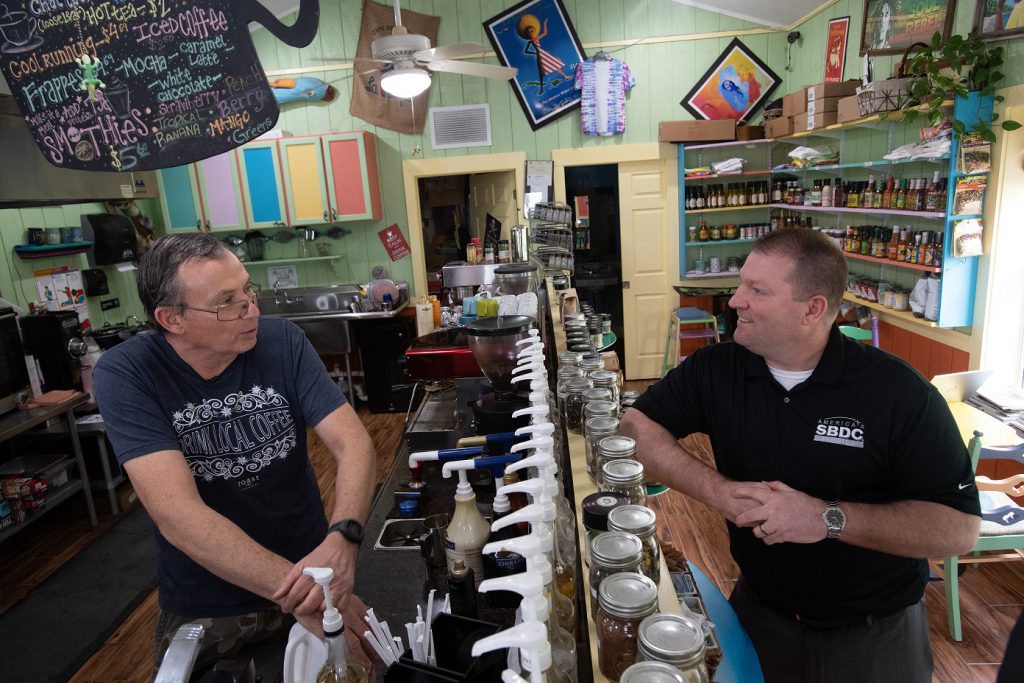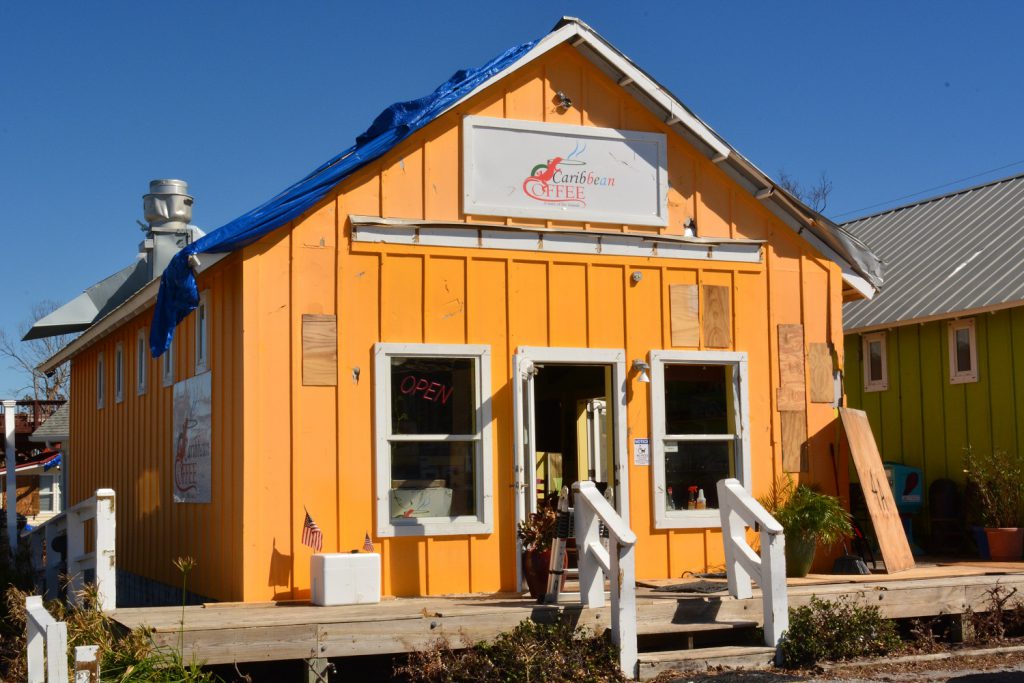By: Dianne Hafleigh, Communication Specialist, Florida SBDC Network [Article appeared 12/31/18 in the Bay County Chamber's Bay Biz Magazine.]
On October 10, Hurricane Michael slammed into the Florida Panhandle, packing maximum sustained winds of 155 miles per hour and leaving behind an unprecedented path of damage and devastation. As residents slowly begin to pick up the pieces, many small businesses impacted by the storm are facing an uncertain path to recovery.
In Bay County, there are 18,545 small businesses with less than 500 employees. These small businesses, like Mexico Beach-based Caribbean Coffee, are the heart and soul of our communities—adding vibrancy, character, and employing three out of every four private sector jobs.

After Hurricane Michael swept ashore, David Kiser, owner of Caribbean Coffee, could not believe that his store was still standing. His store, which he opened in 2013, serves roasted, ground, and brewed coffees, pastries, and homemade sandwiches in a relaxed, island-inspired atmosphere.
Prior to his stores’ reopening, Kiser opened his doors and served complimentary coffee using water bottles and an electric kettle to weary residents and first responders.
As he told News 13, “The plan was to open up as quickly as possible when I saw how limited the damage was…Anything that leads to normalcy puts a smile back on somebody’s face and that’s what I was trying to give them.”
 Immediately following the storm, the Florida SBDC Network, the state’s principal provider of small business assistance, worked with the U.S. Small Business Administration (SBA) and the Florida Department of Economic Opportunity (DEO) to establish business recovery centers in communities most adversely impacted by the storm.
Immediately following the storm, the Florida SBDC Network, the state’s principal provider of small business assistance, worked with the U.S. Small Business Administration (SBA) and the Florida Department of Economic Opportunity (DEO) to establish business recovery centers in communities most adversely impacted by the storm.
Within ten days, the Florida SBDC Network and SBA established 10 business recovery centers, deploying resources and personnel to help business owners apply for state and federal disaster loans and navigate other post-disaster challenges.
For Kiser, the state-backed Florida Small Business Emergency Bridge Loan served as an immediate source of capital to make repairs and reopen. Nearly a month following the storm, Kiser reopened Caribbean Coffee and, as a token of his appreciation to the community and support received, offered everything free his first day back.
When asked for his advice for other business owners impacted by the storm, Kiser said, “In trying times like these don’t be ashamed to seek and accept help when it is offered. Thanks to the rapid response of the SBDC we were able to engage a local contractor and start repairs while awaiting insurance. This help allowed us to reopen quickly and put our employees back to work.”
Recovery Tips for Small Businesses
In the wake of Hurricane Michael, small businesses face a tough road ahead. To help, the Florida SBDC Network recommends small business owners consider the following:
1. Get started as soon as possible.
As business owners know, every day closed means lost money, time, and clients. Business owners should show initial signs of recovery as much as possible. As applicable, businesses can consider opening with a limited menu or service offering. Even a simple sign on the door that says “We’ll be back soon” can help reassure employees, customers, and vendors to come back.
2. Know where the help is.
While the bridge loan and SBA physical disaster loan deadlines have passed, small businesses physically and/or economically injured from Hurricane Michael still have time to apply for the SBA’s Economic Injury Disaster Loan, which provides up to $2 million in working capital to help businesses survive until normal operations resume following a disaster.
While the application deadline is not until July 11, 2019, small business owners who believe they need the loan should begin the application process as soon as possible as the application requires financial records and, if they have been destroyed, it will take time to replace them.
Businesses interested in the EIDL should visit www.FloridaSBDC.org/disaster for more information.
Small businesses can also contact their local Florida SBDC office for help with the application and other post-disaster challenges.
The Florida SBDC Network employs professional business consultants and disaster specialists, many of whom are Disaster Recovery Institute (DRI) Certified Business Continuity Professionals.
Additionally, the Florida Department of Economic Opportunity (DEO) recently launched www.FloridaDisaster.biz, a website that offers business owners a comprehensive guide to preparing, responding, and recovering from disasters. Businesses should visit the site for information on other available state and federal resources.
3. Plan ahead.
Finally, once business owners make progress towards their recovery, they should plan ahead for the possibility of future disasters and business interruptions.
The state has preparation resources available, including a disaster planning toolkit, at FloridaDisaster.biz.
Additionally, the Florida SBDC Network can help business owners create a business continuity plan at no cost.
For more information, and to view additional preparedness and recovery resources, please visit www.FloridaSBDC.org.



